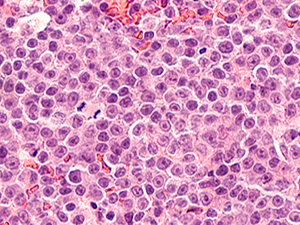New Approval Adds to Growing List of Therapies for B-cell Lymphoma
The FDA granted accelerated approval to another bispecific T-cell engager to treat certain B-cell lymphomas
The U.S. Food and Drug Administration (FDA) has granted accelerated approval to glofitamab-gxbm (Columvi) for select patients with B-cell lymphoma whose disease did not respond to or relapsed following two or more lines of systemic therapy.
The indication is for a subtype of diffuse large B-cell lymphoma (DLBCL) called DLBCL not otherwise specified (DLBCL, NOS) and for large B-cell lymphoma (LBCL) arising from follicular lymphoma.

Glofitamab-gxbm is a type of immunotherapy called a bispecific T-cell engager (BiTE). BiTEs are antibodies that can bind two different proteins simultaneously and are used to bring T cells and cancer cells in close proximity to allow the T cells to respond to the cancer cells. Glofitamab-gxbm binds the CD3 receptor present on T cells and the CD20 antigen that is highly expressed on B-cell lymphoma cells.
Another CD20/CD3-targeted BiTE, epcoritamab (Epkinly), recently received accelerated approval for certain B-cell lymphomas. Other BiTEs approved to treat hematologic malignancies include blinatumomab (Blincyto), teclistamab (Tecvayli), and mosunetuzumab (Lunsumio).
The approval of glofitamab-gxbm was based on results from the open-label, multicenter, single-arm NP30179 trial. In this phase I/II trial, the efficacy of glofitamab-gxbm was evaluated in 132 patients, 80% of whom had relapsed or refractory DLBCL, NOS, and 20% of whom had LBCL arising from follicular lymphoma. Patients had received two or more prior lines of systemic therapy.
The overall response rate was 56%, and 43% of patients experienced complete responses. The estimated median duration of response was 18.4 months.
The approval included a boxed warning indicating that the treatment can cause serious or life-threatening immune-related adverse reactions and should only be administered by qualified health care professionals with appropriate medical support.
LBCL is a type of non-Hodgkin lymphoma that arises from B cells. DLBCL is the most common form of LBCL and accounts for 30 to 40% of all non-Hodgkin lymphoma cases. Different subtypes of DLBCL exist. When a case doesn’t fit into any of those subtypes, it is classified as DLBCL, NOS. In some cases, follicular lymphoma, another type of B-cell lymphoma that is usually slow-growing, can be a precursor to LBCL.
According to federal statistics, approximately 80,550 individuals will be diagnosed with non-Hodgkin lymphoma, and 20,180 patients would die of the disease in the U.S. in 2023.
The FDA rendered its decision on June 15, 2023. Accelerated approval means that continued approval may be contingent upon a confirmatory trial.
